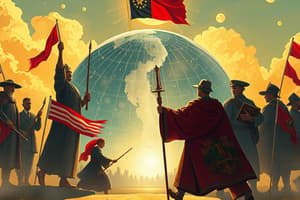Podcast
Questions and Answers
What defines a populist political approach?
What defines a populist political approach?
- Advocating for elitist power structures
- Representing the interests of ordinary people (correct)
- Promoting economic policies that favor large corporations
- Encouraging policies that reduce individual freedoms
What is the main focus of an inside strategy?
What is the main focus of an inside strategy?
- Creating partnerships with independent states
- Allocating resources based on public votes
- Engaging with the broader world for influence
- Improving conditions within a specific organization or system (correct)
Which of the following describes negative liberty?
Which of the following describes negative liberty?
- Being free to pursue one's own goals without obstacles (correct)
- The ability to remove government restrictions
- The provision of necessary conditions for success
- Government support for social welfare initiatives
What is the role of the legislature in a government?
What is the role of the legislature in a government?
What does a responsible government require?
What does a responsible government require?
What is a characteristic of a confederation?
What is a characteristic of a confederation?
What is the purpose of checks and balances in a government system?
What is the purpose of checks and balances in a government system?
How does a runoff election operate?
How does a runoff election operate?
Flashcards
Block Vote
Block Vote
A voting system where members of a political party vote together as a unit, following their party's instructions.
Populist
Populist
A politician who focuses on representing ordinary people, often against powerful groups.
Liberal
Liberal
A political ideology that supports freedom, equality, and progress. They often favor government action to reduce inequality and promote social welfare.
Public Sphere
Public Sphere
Signup and view all the flashcards
Private Sphere
Private Sphere
Signup and view all the flashcards
Inside Strategy
Inside Strategy
Signup and view all the flashcards
Outside Strategy
Outside Strategy
Signup and view all the flashcards
Unitary State
Unitary State
Signup and view all the flashcards
Study Notes
Block Voting
- Block voting is a voting system where parties vote as a bloc, rather than individual candidates.
Populist Parties
- Populist parties represent ordinary people, often opposing elites and powerful groups.
- They try to gain support by presenting themselves as regular people.
Liberal Parties
- Liberal parties support freedom, equality, and social progress.
- They support government involvement to improve social welfare and reduce inequality.
Public Sphere
- The public sphere is where people gather to discuss ideas, share opinions, and debate important issues.
Private Sphere
- The private sphere is where individuals have personal control and privacy to make decisions.
Inside Strategy
- An inside strategy focuses on improving a specific organization, group, or system from within.
Outside Strategy
- An outside strategy focuses on influencing external factors beyond your organization or group.
Unitary States
- Unitary states concentrate power in a central government.
Confederations
- Confederations are groups of independent states forming a loose alliance.
Alternative Vote
- In an alternative vote system, voters rank candidates.
Runoff Elections
- Runoff elections occur when no candidate wins a majority of votes in the first round.
- The top two candidates compete in a second round.
Legislature
- The legislature's main role is to create and pass laws.
Executive
- The executive branch puts laws into action and manages daily operations.
Responsible Government
- A responsible government is accountable to the people and follows legislative rules.
- It answers to public trust and can be removed if their trust is broken.
Checks and Balances
- Checks and balances ensure that no government branch becomes too powerful.
Positive Liberty
- Positive liberty focuses on having the power and conditions to be truly free and successful.
Negative Liberty
- Negative liberty emphasizes freedom from obstacles or restrictions.
Majoritarian Systems
- Majoritarian systems are based on majority rule.
Proportional Representation
- Proportional representation aims to ensure election results accurately reflect voter support.
Social Democracy
- Social democracy combines democratic governance with social policies.
Studying That Suits You
Use AI to generate personalized quizzes and flashcards to suit your learning preferences.
Description
Test your knowledge on various political concepts including block voting, populist and liberal parties, and strategies used in political systems. This quiz will help you understand the nuances of the public and private spheres, as well as inside and outside strategies. Enhance your comprehension of how these elements interact in governance.




